
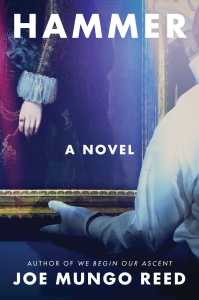
It’s 2013, and much of the world still reels from the global economic collapse. Yet in the auction rooms of London, artworks are selling for record-breaking prices. Seeking a place in this gilded world is Martin, a junior specialist at a prestigious auction house. Martin spends his days catering to the whims of obscenely wealthy clients and his nights drinking in grubby pubs with his demoralized roommate. However, a chance meeting with Marina, an old university friend, presents Martin with a chance to change everything.
Pursuing distraction from her failing marriage and from a career she doesn’t quite believe in, Marina draws Martin into her circle and that of her husband, Oleg, an art-collecting oligarch. Shaken by the death of his mother and chafing against his diminishing influence in his homeland, Oleg appears primed to change his own life—and perhaps to relinquish his priceless art collection long coveted by London’s auction houses. Martin is determined to secure the sale and transform his career. But his ambitions are threatened by factors he hasn’t reckoned with: a dangerous attraction between himself and Marina, and half-baked political plans through which Oleg aims to redeem himself and Russia but which instead imperil the safety of the oligarch and all those around him.
Haitian-American Vodou priestess Mambo Reina Dumond runs a healing practice from her New Orleans home. Gifted with water magic since she was a child, Reina is devoted to the benevolent traditions of her ancestors.
After a ritual slaying in the French Quarter, police arrest a fellow vodouisant. Detective Roman Frost, Reina’s ex-boyfriend—a fierce nonbeliever—is eager to tie the crime, and half a dozen others, to the Vodou practitioners of New Orleans. Reina resolves to find the real killer and defend the Vodou practice and customs, but the motives behind the murder are deeper and darker than she imagines.
As Reina delves into the city’s shadows, she untangles more than just the truth behind a devious crime. It’s a conspiracy. As a killer wields dangerous magic to thwart Reina’s investigation, she must tap into the strength of her own power and faith to solve a mystery that threatens to destroy her entire way of life.


Lady Sophia Huntington Villiers is no stranger to intrigue, as her work with Alan Turing’s Bombe Machines at Bletchley Park during the war attests. Her wartime marriage of convenience to Simon Barre, the eighth earl of Camden, granted her the independence she craved and saved his estate. Now, as part of his covert team in postwar Vienna, she uses her charm to uncover a lethal double agent immersed in the world of relics—including the long lost death mask of Mozart.
Simon is determined to gather any information he can to end the Cold War before it becomes as devastating as the war Britain has just won. He has been secretly in love with Sophie Villiers for years, and their work together in Vienna leads him to hope for genuine romance in their marriage. Until a mission in Prague drives Sophie to a decision that will brand her not only a traitor to her country but also to her husband.
With Sophie’s allegiance in question, Simon is torn between his duty to the crown and saving the woman who might have betrayed his cause and his heart.
In a small, provincial town behind the Iron Curtain, Sasha lives in a house full of secrets, one of which is her own dream of becoming an actress. When she leaves for Moscow to audition for drama school, she defies her mother and grandparents and abandons her first love, Andrei.
Before she leaves, Sasha discovers the hidden war journal of her uncle Kolya, an artist still missing in action years after the war has ended. His pages expose the official lies and the forbidden truth of Stalin’s brutality. Kolya’s revelations and his tragic love story guide Sasha through drama school and cement her determination to live a thousand lives onstage. After graduation, she begins acting in Leningrad, where Andrei, now a Communist Party apparatchik, becomes a censor of her work. As a past secret comes to light, Sasha’s ambitions converge with Andrei’s duties, and Sasha must decide if her dreams are truly worth the necessary sacrifice and if, as her grandmother likes to say, all will indeed be well.
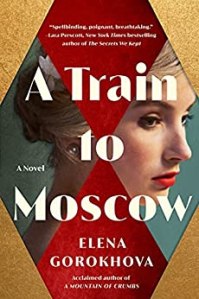
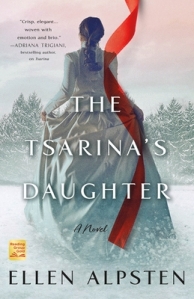
Born into the House of Romanov to the all-powerful Peter the Great and his wife, Catherine, a former serf, beautiful Tsarevna Elizabeth is the envy of the Russian empire. She is insulated by luxury and spoiled by her father, who dreams for her to marry King Louis XV of France and rule in Versailles. But when a woodland creature gives her a Delphic prophecy, her life is turned upside down. Her volatile father suddenly dies, her only brother has been executed and her mother takes the throne of Russia.
As friends turn to foes in the dangerous atmosphere of the Court, the princess must fear for her freedom and her life. Fate deals her blow after blow, and even loving her becomes a crime that warrants cruel torture and capital punishment: Elizabeth matures from suffering victim to strong and savvy survivor. But only her true love and their burning passion finally help her become who she is. When the Imperial Crown is left to an infant Tsarevich, Elizabeth finds herself in mortal danger and must confront a terrible dilemma–seize the reins of power and harm an innocent child, or find herself following in the footsteps of her murdered brother.
Hidden behind a gorgeous, wildly decadent façade, the Russian Imperial Court is a viper’s den of intrigue and ambition. Only a woman possessed of boundless courage and cunning can prove herself worthy to sit on the throne of Peter the Great.
Each summer the girls of Deck Five come back to Marshall Naval School. They sail on jewel-blue waters; they march on green drill-fields; they earn sunburns and honors. They push until they break apart and heal again, stronger.
Each summer Margaret and Rose and Flor and Nisreen come back to the place where they are girls, safe away from the world: sisters bound by something more than blood.
But this summer everything has changed. Girls are missing and a boy is dead. It’s because of Margaret Moore, the boys say. It’s because of what happened that night in the storm.
Margaret’s friends vanish one by one, swallowed up into the lies she has told about what happened between her and a boy with the world at his feet. Can she unravel the secrets of this summer and last, or will she be pulled under by the place she once called home?

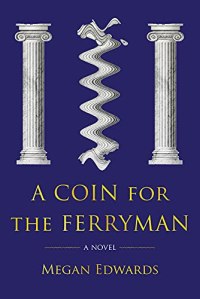
In 1999, an elite interdisciplinary team headed by Nobel laureate Andrew Danicek gathered in California to carry out a ground-breaking time-travel experiment. While the rest of the world remained unaware, Julius Caesar was successfully transported from the last day of his life to a specially-constructed covert facility. Four days of conversation with historians and Latin scholars were planned, followed by Caesar’s return to the moment from which he was extracted. But despite the team’s meticulous efforts to maintain secrecy and plan for all possible exigencies, a kidnap attempt plunges Caesar into peril. Fully aware that the future of civilization may hang in the balance, one team member must summon strength she didn’t know she possessed to return Caesar to the Ides of March.
After talking her way into a job with Dan Mansfield, the leading investigative reporter in Chicago, rising young journalist Jules Roth is given an unusual–and very secret–assignment. Dan needs her to locate a painting stolen by the Nazis more than 75 years earlier: legendary Expressionist artist Ernst Engel’s most famous work, Woman on Fire. World-renowned shoe designer Ellis Baum wants this portrait of a beautiful, mysterious woman for deeply personal reasons, and has enlisted Dan’s help to find it. But Jules doesn’t have much time; the famous designer is dying.
Meanwhile, in Europe, provocative and powerful Margaux de Laurent also searches for the painting. Heir to her art collector family’s millions, Margaux is a cunning gallerist who gets everything she wants. The only thing standing in her way is Jules. Yet the passionate and determined Jules has unexpected resources of her own, including Adam Baum, Ellis’s grandson. A recovering addict and brilliant artist in his own right, Adam was once in Margaux’s clutches. He knows how ruthless she is, and he’ll do anything to help Jules locate the painting before Margaux gets to it first.
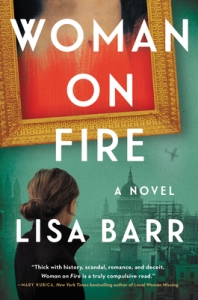

Anna loves Girls’ Night with her friends. With the kids safely in bed, it’s a chance for the women to let loose, enjoy some wine, and just laugh. But after one lively evening, Anna doesn’t arrive for school drop-off the next morning—or the next, or the next.
Everyone, especially her husband and young son, are frantic with worry but none more so than Grace, her childhood best friend. Grace is certain that someone is hiding the truth about Anna’s unexplained disappearance. As rumors fly and accusations are whispered among neighbors, Grace decides to take matters into her own hands and find out what happened to Anna…or die trying.
By April 1916, the fervor that accompanied war’s outbreak has faded. In its place is a grim reality. Throughout Germany, essentials are rationed. Hope, too, is in short supply. Anna Zeller, whose fiancé, Bruno, is fighting on the western front, works as a nurse at an overcrowded hospital in Oldenburg, trying to comfort men broken in body and spirit. But during a visit from Dr. Stalling, the director of the Red Cross Ambulance Dogs Association, she witnesses a rare spark of optimism: as a German shepherd guides a battle-blinded soldier over a garden path, Dr. Stalling is inspired with an idea—to train dogs as companions for sightless veterans.
Anna convinces Dr. Stalling to let her work at his new guide dog training school. Some of the dogs that arrive are themselves veterans of war, including Nia, a German shepherd with trench-damaged paws. Anna brings the ailing Nia home and secretly tends and trains her, convinced she may yet be the perfect guide for the right soldier. In Max Benesch, a Jewish soldier blinded by chlorine gas at the front, Nia finds her person.
War has taken Max’s sight, his fiancée, and his hopes of being a composer. Yet despite all he’s given for his country, the tide of anti-Semitism at home is rising, and Max encounters it first-hand in one of the school’s trainers, who is determined to make Max fail. Still, through Anna’s prompting, he rediscovers his passion for music. But as Anna discovers more about the conflict’s escalating brutality—and Bruno’s role in it—she realizes how impossible it will be for any of them to escape the war unscathed


1940. In a world newly burning with war, and in spite of her American family’s wishes, Virginia decides to stay in occupied France with her French husband. She’s sure that if they keep their heads down they’ll make it through. But as the call to resist the enemy grows around her, Virginia must decide if she’s willing to risk everything to help those in need.
Nineteen-year-old Violette is a crack shot with an unquenchable spirit of adventure, and she’s desperate to fight the Nazis however she can. When her mother sends her to find an exiled soldier, Violette meets the man who will change her life. Then tragedy strikes, and Britain’s clandestine war organization—the Special Operations Executive—learns of Violette’s dual citizenship and adept firearm handling and starts to recruit her. But Violette is no stranger to loss and must decide whether the cost of defiance is too great a price to pay.
On Crow Island, people whisper, real magic lurks just below the surface.
Neither real magic nor faux magic interests Annie Mason. Not after it stole her future. She’s only on the island to settle her late father’s estate and, hopefully, reconnect with her long-absent best friend, Beatrice, who fled their dreary lives for a more glamorous one.
Yet Crow Island is brimming with temptation, and the biggest one may be her enigmatic new neighbor.
Mysterious and alluring, Emmeline Delacroix is a figure shadowed by rumors of witchcraft. And when Annie witnesses a confrontation between Bea and Emmeline at one of the island’s extravagant parties, she is drawn into a glittering, haunted world. A world where the boundaries of wickedness are tested, and the cost of illicit magic might be death.
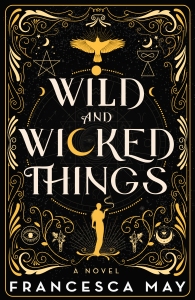
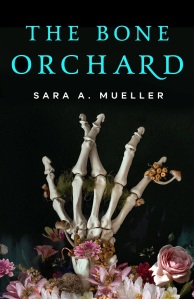
Charm is a witch, and she is alone. The last of a line of conquered necromantic workers, now confined within the yard of regrown bone trees at Orchard House, and the secrets of their marrow.
Charm is a prisoner, and a survivor. Charm tends the trees and their clattering fruit for the sake of her children, painstakingly grown and regrown with its fruit: Shame, Justice, Desire, Pride, and Pain.
Charm is a whore, and a madam. The wealthy and powerful of Borenguard come to her house to buy time with the girls who aren’t real.
Except on Tuesdays, which is when the Emperor himself lays claim to his mistress, Charm herself.
She’s an artist whose portraits alter people’s real-life bodies, a talent she must hide from those who would kidnap, blackmail, and worse in order to control it. Guarding that secret is the only way to keep her younger sister safe now that their parents are gone.
But one frigid night, the governor’s wife discovers the truth and threatens to expose Myra if she does not complete a special portrait that would resurrect the governor’s dead son. Desperate, Myra ventures to his legendary stone mansion.
Once she arrives, however, it becomes clear the boy’s death was no accident. Someone dangerous lurks within these glittering halls. Someone harboring a disturbing obsession with portrait magic.
Myra cannot do the painting until she knows what really happened, so she turns to the governor’s older son, a captivating redheaded poet. Together, they delve into the family’s most shadowed affairs, racing to uncover the truth before the secret Myra spent her life concealing makes her the killer’s next victim.
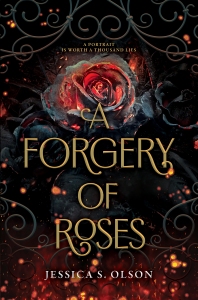
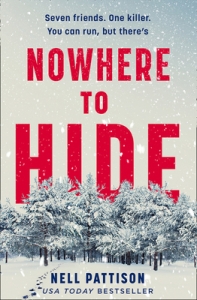
The winter hike is meant to bring their nature group together.
Emily, the sister who never lets her hearing loss hold her back.
Lauren, the sister who always feels a step behind.
Morna, who doesn’t get on with Lauren.
Ben, whose feelings for Emily border on obsession.
Dan, the quiet newcomer to the group.
Kai, who isn’t just on the hike to enjoy the wildlife.
And Alec, the one who knows all their secrets.
Dark Fell Barn is a “perfectly isolated” retreat, or so says its website when Jayne books a reservation for her friends. A quiet place, far removed from the rest of the world, is exactly what they need.
The women arrive for a girls’ night ahead of their husbands. There’s ex-Army Jayne, hardened and serious, but also damaged. Ruth, the driven doctor and new mother who is battling demons of her own. Young Emily, just wed and insecure, the newest addition of this tight-knit band. Missing this year is Edie, who was the glue holding them together until her husband died suddenly.
But what they hoped would be a relaxing break soon turns to horror. Upon arrival at Dark Fell Barn, the women find a devastating note claiming one of their husbands will be murdered. There are no phones, no cell service to check on their men. Friendships fracture as the situation spins wildly out of control. Betrayal can come in many forms.
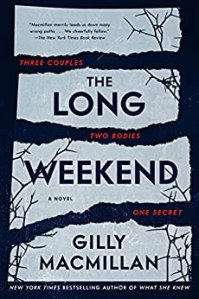
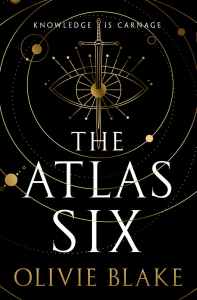
The Alexandrian Society is a secret society of magical academicians, the best in the world. Their members are caretakers of lost knowledge from the greatest civilizations of antiquity. And those who earn a place among their number will secure a life of wealth, power, and prestige beyond their wildest dreams. Each decade, the world’s six most uniquely talented magicians are selected for initiation – and here are the chosen few…
– Libby Rhodes and Nicolás Ferrer de Varona: inseparable enemies, cosmologists who can control matter with their minds.
– Reina Mori: a naturalist who can speak the language of life itself.
– Parisa Kamali: a mind reader whose powers of seduction are unmatched.
– Tristan Caine: the son of a crime kingpin who can see the secrets of the universe.
– Callum Nova: an insanely rich pretty boy who could bring about the end of the world. He need only ask.
When the candidates are recruited by the mysterious Atlas Blakely, they are told they must spend one year together to qualify for initiation. During this time, they will be permitted access to the Society’s archives and judged on their contributions to arcane areas of knowledge. Five, they are told, will be initiated. One will be eliminated. If they can prove themselves to be the best, they will survive. Most of them.
When Margaret Welty spots the legendary hala, the last living mythical creature, she knows the Halfmoon Hunt will soon follow. Whoever is able to kill the hala will earn fame and riches, and unlock an ancient magical secret. If Margaret wins the hunt, it may finally bring her mother home. While Margaret is the best sharpshooter in town, only teams of two can register, and she needs an alchemist.
Weston Winters isn’t an alchemist–yet. Fired from every apprenticeship he’s landed, his last chance hinges on Master Welty taking him in. But when Wes arrives at Welty Manor, he finds only Margaret and her bloodhound Trouble. Margaret begrudgingly allows him to stay, but on one condition: he must join the hunt with her.
Although they make an unlikely team, Wes is in awe of the girl who has endured alone on the outskirts of a town that doesn’t want her, in this creaking house of ghosts and sorrow. And even though Wes disrupts every aspect of her life, Margaret is drawn to him. He, too, knows what it’s like to be an outsider. As the hunt looms closer and tensions rise, Margaret and Wes uncover dark magic that could be the key to winning the hunt – if they survive that long.
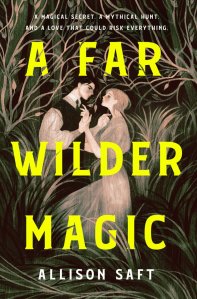
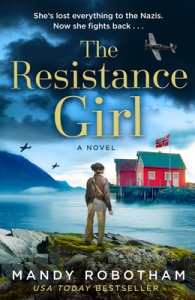
Norway, 1942. War rages, and operation Shetland bus is in full swing. Under cover of darkness, Rumi Orlstad and other locals smuggle British agents, fugitives and supplies across the North Sea to the relative safety of Scotland.
But when one mission goes awry, and Rumi’s husband is lost to the dangerous waters, she retreats from the clandestine group, vowing never to take to the seas again.
Meanwhile, her childhood friend Anya has been placed in Lebensborn, one of Himmler’s secret Aryan maternity camps. And when Rumi learns the fate of Anya’s child, she knows she has no choice but to face her fears and help Anya flee from Nazi grip…
After her eighteenth birthday, Hilde, a former orphan in 1930s Berlin, goes out into the world to discover her place in it. But finding a job is hard, at least until she stumbles into Café Lila, a vibrant cabaret full of expressive customers—and Rosa, the club’s waitress and performer. As the café and all who work there embrace Hilde, and she embraces them in turn, she discovers her voice and her own blossoming feelings for Rosa.
But Berlin is in turmoil. Between the elections, protests in the streets, and the beginning seeds of unrest in Café Lila itself, Hilde will have to decide what’s best for her future
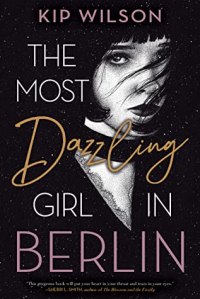

In the snowbound city of Kiev, wry and bookish history student Mila Pavlichenko organizes her life around her library job and her young son–but Hitler’s invasion of Russia sends her on a different path. Given a rifle and sent to join the fight, Mila must forge herself from studious girl to deadly sniper–a lethal hunter of Nazis known as Lady Death. When news of her three hundredth kill makes her a national heroine, Mila finds herself torn from the bloody battlefields of the eastern front and sent to America on a goodwill tour.
Still reeling from war wounds and devastated by loss, Mila finds herself isolated and lonely in the glittering world of Washington, DC–until an unexpected friendship with First Lady Eleanor Roosevelt and an even more unexpected connection with a silent fellow sniper offer the possibility of happiness. But when an old enemy from Mila’s past joins forces with a deadly new foe lurking in the shadows, Lady Death finds herself battling her own demons and enemy bullets in the deadliest duel of her life.







































 Un portrait de Gareth Jones, le journaliste gallois qui a été le premier à révéler le génocide par la famine en Ukraine perprété en 1933 par l’URSS de Staline.
Un portrait de Gareth Jones, le journaliste gallois qui a été le premier à révéler le génocide par la famine en Ukraine perprété en 1933 par l’URSS de Staline.